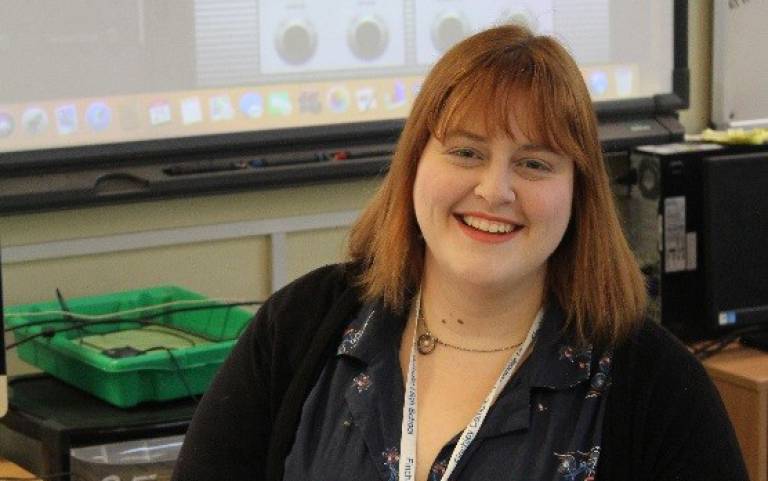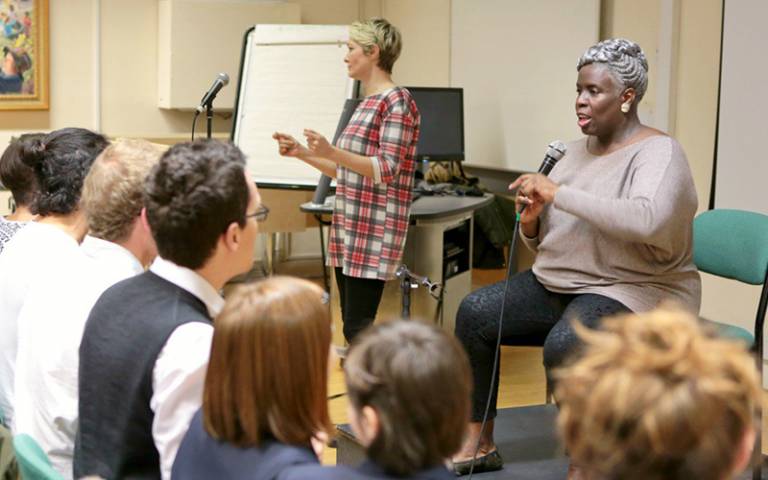Kate is an Australian music teacher studying part-time on the Music Education MA. She talks about the value of music education, and how she plans to further her career.

Hi Kate!
Can you begin by telling us what your route to graduate study has been?
I graduated from a Bachelor of Music Education from the Elder Conservatorium, University of Adelaide, and in 2009 I taught classroom Music and IT for five years in Australia before moving to the UK to continue teaching.
What are your motivations for pursuing a graduate-level qualification?
I’ve been working in London since 2015, and was interested in gaining a specific UK qualification which would allow me better insight into music education in this country. I’ve always been interested in graduate-level study, and I felt I was at a place in my career which I couldn’t progress how I wanted without it.
Why did you choose the IOE for your MA?
UCL has an international reputation as a leader in educational research, and the range of subjects on offer for the Music Education MA were of particular interest to me. The location in Bloomsbury is incredibility convenient and an easy commute from my home and work in north London.
As such a highly regarded institute, I do think studying at the IOE is a good investment. It is the leading institute in the world for education, and the lecturers are experts in their own fields.
“I have already seen the impact on my own teaching practice, and have been able to bring transferable ideas to the wider teaching community.
What do you think is the best thing about this MA?
The wealth of knowledge and experience of our professors and lecturers. They are always willing to engage in discussion and are readily available via email or one-to-one tutorials. I also enjoy having the opportunity the come together with other music educators from both primary and secondary schools, and those working outside of the education sector.
What do you find interesting about your field of study and what inspires you?
My focus has been primarily around mental health, music and adolescence. Working in secondary schools for almost 10 years, I have seen the positive impact that music has on those most vulnerable in our schools. I am inspired everyday by those students, who can enter the music classroom knowing it is a safe space, and leaving feeling they’ve accomplished something every single day.

What are your career plans once you’ve completed your degree?
At the moment I feel there are any number of paths I can take, with opportunities that have opened up from studying at UCL. I would be interested in pursuing a PhD in the future, or working closely with one of the many music education initiatives in this country.
Have you participated in any networking opportunities?
I attended the scholarships donor events to meet with other academics; that was a wonderful opportunity to speak to those outside of my own MA. Outside of my studies I have networked with other teachers and composers with the Listen Imagine Compose Teacher Network event, and will undertake a role as a Music Tech Champion for the new Musical Futures initiative with Ableton.
The Universal Music UK Sound Foundation bursary allowed me to change from flexible to part-time study which means I am more focussed. Our dissertation supervisor Professor Graham Welch has guided us since day one. This has been the biggest impact as the idea of a dissertation is quite daunting, but he has given us step by step guidance how to complete our studies.
What is it like studying in London?
Walking into the IOE for the first time was both exciting and daunting at the same time. The campus dominates the area around Euston, and being so central to London has allowed students from all areas to come together. It’s always a little bit exciting going into uni for an evening class, and then being able to socialise with your classmates after.
Has there been an element of your degree programme that you think has been particularly valuable?
The vast knowledge and experience of the lecturers still impresses me. When researching, you’re bound to come across at least two of the lecturer’s work multiple times depending on the topic!
How do you think the system of learning/researching at UCL differs from that in your own country?
Compared to Australia, I do feel that UCL allows for a more global perspective and encourages critical analysis from outside of the UK.
Is there anything else you would like to say about your time at the IOE?
I can’t express just how much I am enjoying this new challenge of not only postgraduate study but study in London itself. I have met some wonderful people, and have made positive steps by making these connections.
 Close
Close


